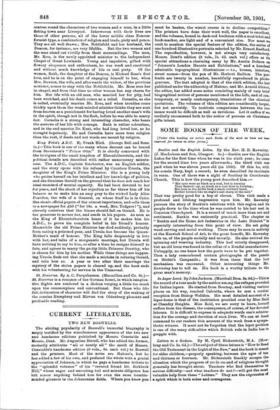King Frit les A.D.C. Bf Frank Bird. (George Bell and
Sons. 6s.)—This book is one of the many whose descent can be traced from Stevenson's " Prince Otto." It is chiefly concerned with the intrigues of the small kingdom of Ehrenfelberstein, and the political details are described with rather unnecessary minute. ness. The A.D.C., Captain Sinchester, was an English soldier, and the story opens with his refusal by Countess Ursula, the daughter of the King's Prime Minister. She is a young lady who prides herself on her intellect and her knowledge of politics, and she dismisses Gerald on the ground that he does not reach her ideal standard of mental capacity. He had been devoted to her for years, and the shock of her rejection so far threw him off his balance as to make him an easy prey to the wicked Lady Alice Pontifex, the wife of a General, on whose Staff he is in Cairo. She steals official papers of the utmost importance, and sells them to a newspaper for £50 (" for 18s. a week, Mrs. Todgers ! "), and cleverly contrives that the blame should fall on Gerald. He is too generous to accuse her, and sends in his papers. As soon as the King of Ehrenfelberstein hears of it he makes him his A.D.C., to prove his complete belief in his friend's honour. Meanwhile the old Prime Minister has died suddenly, probably from eating a poisoned pear, and Ursula has become the Queen- Mother's maid of honour. The King falls desperately in love with her, and talks of a morganatic marriage, but Ursula will have nothing to say to him, so after a time he resigns himself to fate, and agrees to marry the pretty little Princess Dorothy, who is chosen for him by his mother. While these things are happen- ing Ursula finds out that she made a mistake in refusing Gerald, and tells him so. A year or two after their marriage the mystery of the stolen papers is cleared up, and the book ends with his volunteering for service in the Transvaal.














































 Previous page
Previous page